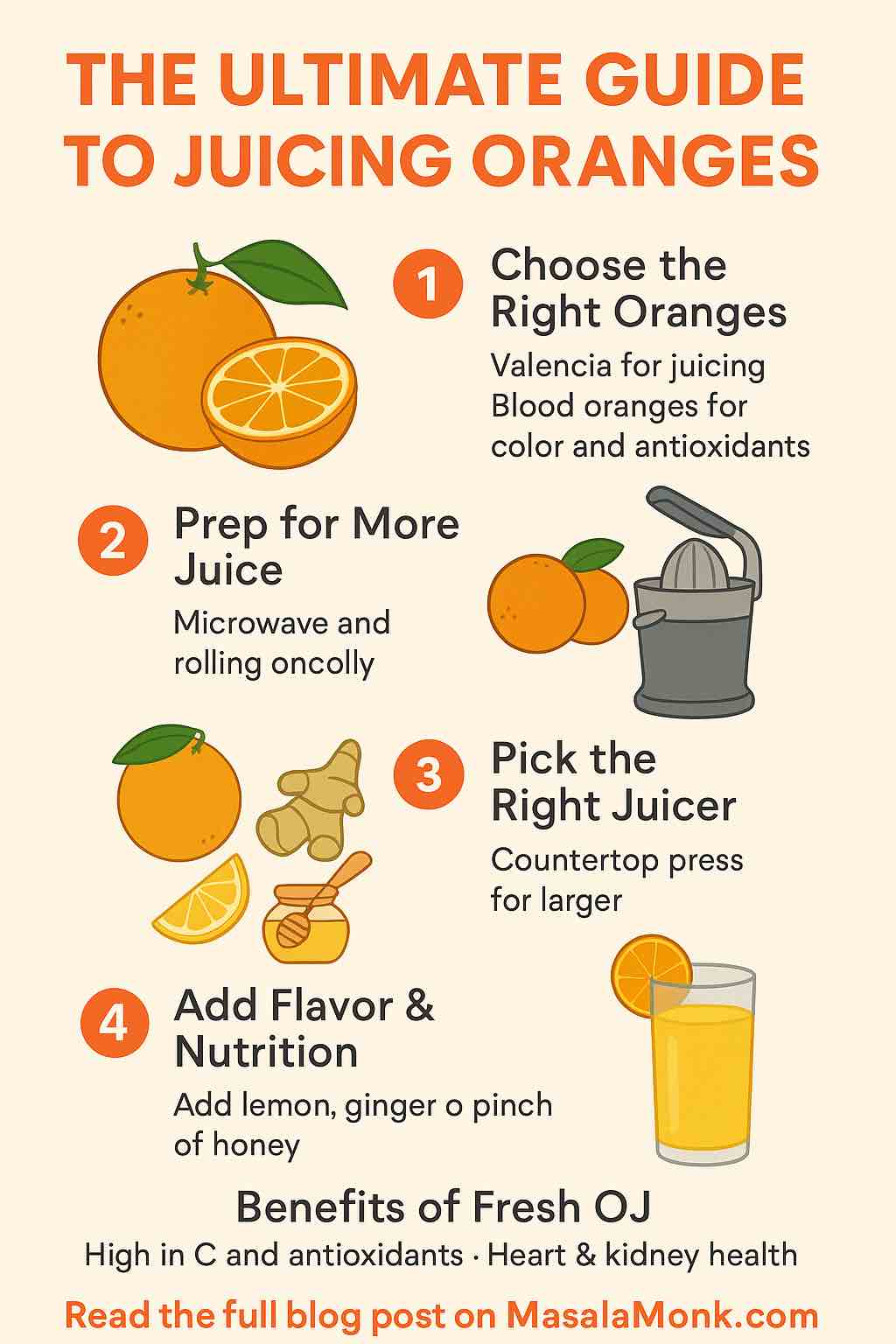
“Orange juice is happiness in a glass — but only if you do it right.”
Juicing oranges is one of life’s simple pleasures. But if you think it’s as easy as slicing and squeezing — you’re missing out on a lot of flavor, nutrition, and even efficiency. In this 2025 deep-dive guide, we’ll explore not only how to juice oranges but how to perfect your technique — backed by science, modern tools, and a few pro secrets.
Let’s squeeze every drop out of your oranges. Literally.
Why Juice Oranges? (The Science Is Stronger Than Ever)
Oranges have been loved for centuries — but modern research continues to discover just how powerful they are:
- High in Vitamin C
A single 8 oz (240 ml) glass can provide over 100% of your daily Vitamin C requirement. - Packed With Flavonoids
Particularly hesperidin, which is linked to improved cardiovascular health, lower blood pressure, and anti-inflammatory effects. - Supports Heart & Cognitive Health
Recent clinical trials (2022–2024) have shown orange juice can reduce LDL (“bad”) cholesterol, increase HDL, and improve blood vessel function, even aiding cognition. - Kidney Stone Prevention
Its natural citrates help reduce stone formation risk by alkalizing the urine. - Glycemic Stability
Despite containing natural sugars, 100% orange juice causes lower glucose spikes compared to processed sugar beverages, especially when consumed with meals.
Pro Tip: Fresh orange juice offers maximum benefits versus store-bought juice that may be concentrated, frozen, or stored for long periods.
Selecting the Best Oranges for Juicing
🍊 Top Varieties
| Variety | Characteristics | Best Use |
|---|---|---|
| Valencia | Sweet, juicy, few seeds | Best for juicing |
| Navel | Sweet but can turn bitter after sitting | Great for quick consumption |
| Blood Oranges | Red hue, tart-sweet, rich in antioxidants | Gourmet blends |
| Cara Cara | Pink flesh, low acid | Smooth, mild juices |
Avoid: Overripe or underripe fruit. Overripe oranges yield bitter juice; underripe ones lack flavor and juice.
The Secret Prep Work Before You Juice
Yes — how you handle your oranges before juicing matters a lot:
1️⃣ Bring Oranges to Room Temperature
Cold oranges yield less juice. Let them sit at room temperature for at least 30 minutes.
2️⃣ Quick Microwave Hack
If you’re in a rush, microwave each orange for 10–15 seconds. This relaxes the juice sacs.
3️⃣ Roll & Press
Roll each orange firmly under your palm on the countertop for 10-15 seconds to break internal membranes gently.
4️⃣ Zest First
If you want to use the zest, do it before microwaving or cutting. It’s much easier when the skin is firm.
Choosing the Right Juicer: What Actually Works?
🥄 Manual Reamers
- Cheap and simple.
- Best for 1–2 servings.
- Requires arm work.
✋ Handheld Press Juicers
- Quick, minimal mess.
- Excellent for small batches.
🏋 Countertop Manual Presses (Lever Style)
- Ideal for frequent juicers.
- High juice yield.
- Gentle on delicate flavors.
⚡ Electric Juicers
- Fast, very efficient.
- Best for larger families or frequent use.
- Look for models with pulp control.
Pro Pick 2025: Breville Citrus Press Pro (for serious home users). OXO Good Grips Citrus Squeezer (budget-friendly manual).
The Correct Cutting Technique
Always cut oranges crosswise (through the equator), not from stem to bottom. This exposes more juice sacs for extraction and fits most juicers better.
Avoid pressing the peel too hard to minimize bitter compounds like limonin seeping into your juice.
Pro Flavor & Nutrition Boosters
Orange juice is amazing on its own — but you can elevate both its taste and health profile:
- Add Lemon or Lime
Brightens flavor and adds extra Vitamin C. - Ginger or Turmeric Root
Adds anti-inflammatory power. - Pinch of Salt
Balances acidity and enhances sweetness. - Raw Honey
Natural sweetener with antibacterial properties. - Blend with Other Fruits
Kiwi, pineapple, or berries add fiber, enzymes, and new flavors.
Storage: Fresh vs. Preserved Juice
🍹 Fresh Juice
- Best consumed within 2–3 days.
- Store in airtight glass bottles in the fridge.
- Always shake gently before drinking.
❄️ Freezing
- Freeze in silicone ice trays for longer storage (up to 6 months).
- Thaw slowly in the fridge for best flavor retention.
Important: Vitamin C degrades with time, light, and air exposure. The fresher, the better.
The Future of Juicing: What’s New in 2025?
Recent innovations have made juicing even more nutrient-rich:
- Pectinase Enzyme Pre-treatment: Used in some commercial operations to boost juice yield up to 15% and preserve more antioxidants.
- Non-Thermal Processing (HPP & PEF): High-pressure or pulsed electric field processing preserves vitamin C and natural cloudiness better than traditional pasteurization.
- Cloud Stabilization Techniques: Adding pectin from kiwi or passion fruit can naturally keep homemade juice looking and tasting better longer.
While most of these remain industrial for now, it’s exciting to see home appliance companies starting to adapt some of these technologies.
Quick Troubleshooting Table
| Problem | Solution |
|---|---|
| Bitter taste | Avoid over-squeezing peel; blend with lemon or honey |
| Low juice yield | Warm oranges; roll before cutting |
| Juice separates | Shake before serving; add small amounts of pectin-rich fruits |
| Too sweet | Add lemon or blend with low-sugar fruits like berries |
| Too sour | Blend in ripe bananas or mango |
Conclusion: The Joy of Perfect Orange Juice
With just a little extra care, your morning glass of orange juice can be transformed into a nutrient powerhouse that’s fresher, healthier, and infinitely more flavorful than anything off the shelf. Juicing isn’t just about squeezing — it’s about unlocking the full potential of one of nature’s most perfect fruits.
🍊 10 Frequently Asked Questions (FAQs)
1️⃣ What type of oranges are best for juicing?
Answer:
Valencia oranges are ideal for juicing due to their high juice content and balanced sweetness. Navel oranges are good for immediate consumption but can become bitter if stored too long after juicing. For a unique taste and color, try blood oranges or Cara Cara oranges.
2️⃣ How can I get the maximum juice out of each orange?
Answer:
Bring oranges to room temperature or microwave for 10–15 seconds. Roll them under your palm before cutting to loosen the juice sacs. Always cut crosswise for the best yield.
3️⃣ Is fresh orange juice healthier than store-bought?
Answer:
Yes. Freshly squeezed juice retains more vitamin C, flavonoids, and antioxidants. Store-bought juice may undergo pasteurization, concentration, or extended storage, which reduces nutrient content.
4️⃣ How long can I store fresh orange juice?
Answer:
Fresh juice should be consumed within 2–3 days if refrigerated in an airtight container. For longer storage, freeze in ice cube trays and use within 3–6 months.
5️⃣ Why does my orange juice taste bitter sometimes?
Answer:
Over-squeezing the peel releases bitter compounds like limonin. Avoid pressing the peel too hard, and zest the oranges before juicing if zest is needed.
6️⃣ Can I mix other fruits with orange juice?
Answer:
Absolutely! Add lemon or lime for brightness, ginger or turmeric for anti-inflammatory benefits, and kiwi, pineapple, or berries for extra flavor and nutrients.
7️⃣ Does orange juice help prevent kidney stones?
Answer:
Yes. Orange juice raises urinary citrate levels, which can help prevent certain types of kidney stones. Daily consumption has been linked to a lower incidence of stone formation.
8️⃣ Is juicing better than eating whole oranges?
Answer:
Whole oranges provide more fiber, which aids digestion and slows sugar absorption. Juicing delivers concentrated nutrients quickly but with less fiber. Both have unique benefits depending on your health goals.
9️⃣ What’s the best type of juicer for oranges?
Answer:
For small batches, handheld squeezers or manual reamers work well. For frequent use, countertop lever presses or electric citrus juicers offer higher yields and convenience.
🔟 Does heating or freezing affect the nutrients in orange juice?
Answer:
Yes. Heat, light, and oxygen degrade vitamin C and antioxidants. Mild pasteurization retains most nutrients, but high-heat processing or long-term freezing can reduce some nutritional value. Always store juice properly.










